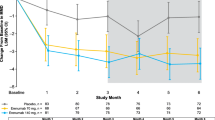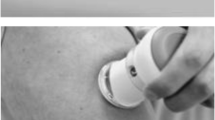Abstract
Objective: To determine the efficacy and tolerability of zolmitriptan 2.5mg oral tablet as an acute treatment for menstrual migraine attacks.
Methods: This was a two-phase, multicentre, randomised, double-blind, placebo-controlled, parallel-group outpatient study (phase I is reported here). The study was conducted at 27 sites in the USA. Eligible women were randomised (1 : 1) to receive either zolmitriptan 2.5mg oral tablet or placebo, and instructed to acutely treat up to two menstrual migraine attacks per menstrual period for up to three menstrual cycles with a single dose of study medication. Menstrual migraine was operationally defined as an attack occurring within the time period of 2 days prior to the expected onset of menses to 5 days after the onset of menses. Participants were asked to treat migraine headaches of moderate or severe intensity only that occurred >24 hours after the end of the last migraine attack and that had not been acutely treated with other medications. Information regarding each migraine attack was recorded by patients in treatment diary cards. The primary efficacy variable was 2-hour headache response (defined as a 2-point drop on a 4-point scale) for all attacks treated. Secondary variables included 1-and 4-hour headache response rate; 1-, 2- and 4-hour headache response based on a 100mm visual analogue scale (VAS); pain-free rate at 1, 2 and 4 hours; use of escape medication; the proportion of patients with recurrence within 24 hours of initial treatment; and tolerability.
Results: The intention-to-treat population comprised 334 patients (zolmitriptan [n = 174]; placebo [n = 160]). Patients treated 625 attacks with zolmitriptan and 529 attacks with placebo. Twice as many patients who took zolmitriptan achieved a 2-hour headache response compared with placebo recipients (65.7% vs 32.8%; p < 0.0001). Furthermore, a significantly higher headache response was observed with zolmitriptan than placebo at all timepoints assessed. Significantly more zolmitriptan recipients were pain-free 2 hours post-dose compared with placebo recipients (p < 0.0001). The use of escape medication was considerably lower in zolmitriptan recipients (42.6% vs 71.3%; p < 0.0001). Based on the reduction in VAS score of ≥30mm from baseline, significantly more zolmitriptan recipients achieved headache response compared with placebo recipients at 1, 2 and 4 hours post-dose (all p < 0.0001). Recurrence was reported in 29.1% of zolmitriptan-treated attacks versus 45.1% of placebo-treated attacks (p = 0.0009), with median time to recurrence of 8.5 and 4.0 hours, respectively. Zolmitriptan was well tolerated.
Conclusion: Oral zolmitriptan is effective and well tolerated for the acute treatment of menstrual migraine attacks. The results are similar to those seen with zolmitriptan in studies of the general migraine population.





Similar content being viewed by others
Notes
The use of trade names is for product identification purposes only and does not imply endorsement.
References
Lipton RB, Stewart WF, Scher AI. Epidemiology and economic impact of migraine. Curr Med Res Opin 2001; 17 Suppl. 1: S4–12
Kornstein SG, Parker AJ. Menstrual migraines: etiology, treatment, and relationship to premenstrual syndrome. Curr Opin Obstet Gynecol 1997; 9: 154–9
MacGregor EA, Chia H, Vohrah RC, et al. Migraine and menstruation: a pilot study. Cephalalgia 1990; 10: 305–10
Brandes JL. The influence of estrogen on migraine: a systematic review. JAMA 2006; 295: 1824–30
Solbach P, Sargent J, Coyne L. Menstrual migraine headache: results of a controlled, experimental, outcome study of non-drug treatments. Headache 1984; 24: 75–8
MacGregor EA, Hackshaw A. Prevalence of migraine on each day of the menstrual cycle in women not using hormonal treatments. Neurology 2004; 63: 351–3
Couturier GM, Bomhof MAM, Knuistingh Neven A, et al. Menstrual migraine in a representative Dutch population sample: prevalence, disability and treatment. Cephalalgia 2003; 23: 302–8
MacGregor EA, Brandes J, Eikermann A, et al. Impact of migraine on patients and their families: the Migraine And Zolmitriptan Evaluation (MAZE) survey: phase III. Curr Med Res Opin 2004; 20: 1143–50
Rapoport AM, Ramadan NM, Adelman JU, et al. Optimizing the dose of zolmitriptan (Zomig, *311C90) for the acute treatment of migraine. Neurology 1997; 49: 1210–8
Solomon GD, Cady RK, Klapper JA, et al. Clinical efficacy and tolerability of 2.5mg zolmitriptan for the acute treatment of migraine. Neurology 1997; 49: 1219–25
The International 311C90 Long-term Study Group. The long-term tolerability and efficacy of oral zolmitriptan (Zomig, 311C90) in the acute treatment of migraine. Headache 1998; 38: 173–83
Tuchman M, Edvinsson L, Geraud G, et al. Zolmitriptan provides consistent migraine relief when used in the long-term. Curr Med Res Opin 1999; 15: 272–81
International Headache Society, Headache Classification Committee. Classification and diagnostic criteria for headache disorders, cranial neuralgias and facial pain. Cephalalgia 1988; 8Suppl. 7: 1–96
Massiou H. Is menstrually associated migraine difficult to treat? Cephalalgia 1999; 19Suppl. 24: 13–5
Facchinetti F, Bonellie G, Kangasniemi P, et al. The efficacy and safety of subcutaneous sumatriptan in the acute treatment of menstrual migraine. Obstet Gynecol 1995; 86: 911–6
Mannix LK, Files JA. The use of triptans in the management of menstrual migraine. CNS Drugs 2005; 19: 951–72
Loder E, Silberstein SD, Abu-Shakra S, et al. Efficacy and tolerability of oral zolmitriptan in menstrually associated migraine: a randomized, prospective, parallel-group, double-blind, placebo-controlled study. Headache 2004; 44: 120–30
Allais G, Acuto G, Cabarrocas X, et al. Efficacy and tolerability of almotriptan versus zolmitriptan for the acute treatment of menstrual migraine. Neurol Sci 2006; 27Suppl. 2: S193–7
Acknowledgements
This study was supported by AstraZeneca.
We thank Steve Winter, from Wolters Kluwer Health, who provided medical writing support funded by AstraZeneca.
Dr Tuchman has received research funding from AstraZeneca, Allergan, GlaxoSmithKline, Merck, Sanofi, Ortho-McNeil, Pozen, Pfizer, Takeda, Eisai and Neurochem, and has received honoraria for speaking or consultations from AstraZeneca, GlaxoSmithKline, Merck, Pfizer and Eisai. Angela Hee was an employee of AstraZeneca at the time the study was completed. Ugochi Emeribe is an employee of AstraZeneca. Stephen Silberstein has received research funding from Abbott, AGA, Allergan, ANS, AstraZeneca, Eli Lilly, Endo Pharmaceuticals, GlaxoSmithKline, Medtronic, Merck, Ortho-McNeil, Pfizer, Pozen and Valeant Pharmaceuticals, and has received honoraria for acting as a speaker and/or Advisory Board member for Allergan, AstraZeneca, Endo Pharmaceuticals, GlaxoSmithKline, Medtronic, Merck, Ortho-McNeil, Pfizer, Pozen and Valeant Pharmaceuticals.
Author information
Authors and Affiliations
Corresponding author
Rights and permissions
About this article
Cite this article
Tuchman, M., Hee, A., Emeribe, U. et al. Efficacy and Tolerability of Zolmitriptan Oral Tablet in the Acute Treatment of Menstrual Migraine. CNS Drugs 20, 1019–1026 (2006). https://doi.org/10.2165/00023210-200620120-00005
Published:
Issue Date:
DOI: https://doi.org/10.2165/00023210-200620120-00005




